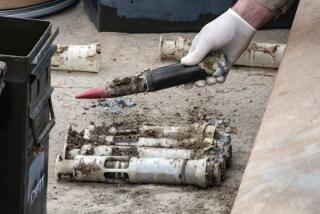NATO Warned of Uranium Risk in 1999, Germany Says
- Share via
BERLIN — NATO warned countries with armies and aid workers in the Balkans about the possible dangers of depleted uranium ammunition, the German Defense Ministry said Sunday. The hardened ammo has recently sparked concern as a possible cause of serious illnesses in soldiers who served in the region.
The ministry confirmed that it received a warning in July 1999 of the risks from the ordnance, used by the United States for its armor-piercing qualities during air campaigns in Yugoslavia and Bosnia-Herzegovina.
According to an internal Defense Ministry document obtained by the Berliner Morgenpost newspaper and dated July 16, 1999, the North Atlantic Treaty Organization warned soldiers and aid workers that month of a “possible toxic threat” and advised them to take “preventive measures.”
The ministry has previously said it began health checks on soldiers who might have come into contact with depleted uranium ammunition that same month--as U.N. peacekeeping forces were still entering Kosovo, a province of Serbia, the main Yugoslav republic, after NATO’s 78-day bombing campaign.
Despite that, the document said NATO planned no further steps, according to the newspaper. The Defense Ministry said it immediately responded with orders for soldiers on how to behave in areas that were targeted with depleted uranium.
The renewed concerns over depleted uranium arose in December after Italy announced an investigation into 30 sick soldiers who had served in the region. Twelve have cancer, and six have died of leukemia.
Since then, numerous other countries with troops in the Balkans have launched testing programs.
The United States has denied there are any health risks from the ammunition.
More to Read
Sign up for Essential California
The most important California stories and recommendations in your inbox every morning.
You may occasionally receive promotional content from the Los Angeles Times.








